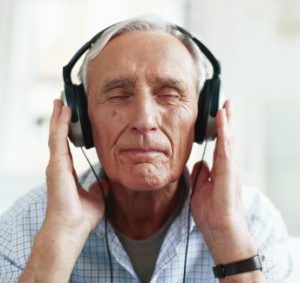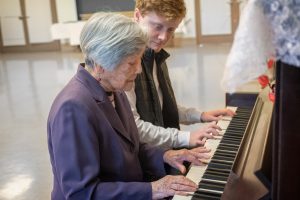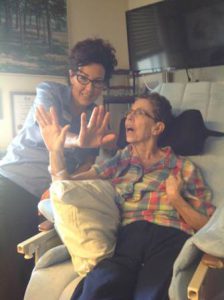
 The traditional hospice team includes healthcare professionals from numerous disciplines, volunteers, and complementary therapists who provide supportive care and comfort through natural approaches. One of these approaches is using music therapy in hospice care.
The traditional hospice team includes healthcare professionals from numerous disciplines, volunteers, and complementary therapists who provide supportive care and comfort through natural approaches. One of these approaches is using music therapy in hospice care.
By definition, music therapy is the clinical and evidence-based use of music by a board-certified music therapist (MT-BC) to meet individuals’ physical, emotional, and spiritual needs. In practice, music therapy for end-of-life care has been shown to accomplish a number of goals.
Our hospice music therapy program benefits South NJ patients in the following ways:

 Our South NJ hospice music therapy services weave together each patient/family’s individual goals and objectives with their unique personal music history and preferences, designing a course of therapy that utilizes primarily live music (including guitar, piano, voice, and/or various percussion instruments) as well as receptive/listening-based interventions during music therapy sessions. Music therapy experiences within end-of-life care may include any of the following:
Our South NJ hospice music therapy services weave together each patient/family’s individual goals and objectives with their unique personal music history and preferences, designing a course of therapy that utilizes primarily live music (including guitar, piano, voice, and/or various percussion instruments) as well as receptive/listening-based interventions during music therapy sessions. Music therapy experiences within end-of-life care may include any of the following:
Please check with your hospice team to find out if you or your loved one is eligible for music therapy. Music therapy is offered in select hospice care locations.

Music has always played a major part in Charity’s life. Raised in a close-knit family of singers, musicians and artists, Charity Jones, MMAT, MT-BC, began singing duets with her father at an early age. Charity went on to major in music education with concentration in voice at West Chester University, and received an undergrad degree in social science from Ashford University. She worked in behavioral health for over 10 years as a behavioral support specialist, working primarily with adults with intellectual disabilities, as well as taught pre-school music around the Philadelphia area. Charity returned to school to complete a master of arts degree in music therapy in 2017. She started working at Samaritan in June of 2020.
Charity has a love of sharing music and creating life-affirming connections with hospice patients. She enjoys working in an interdisciplinary-team setting to create a safe and secure environment for patients, as well as, enhance their quality of life using the wondrous gift of music. In her free time, Charity sings with her family as part of a singing group, occasionally gets involved in stage and theater work in her home city of Philadelphia, and is developing a music therapy program with a drama component for pre-schools in the Philadelphia area.
Enjoy this music play list (10 videos) created especially for you by Samaritan Board-certified Music Therapist Sara Kuhlen, MA. Learn about the benefits of music therapy and the power of singing. Sing along to some of her most-requested songs. Also enjoy songs for relaxation and meditation.